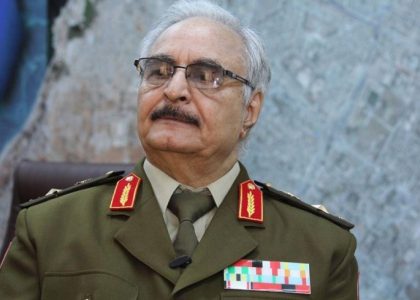
Is Khalifa Haftar helping ISIS return to Libya?
It is now 62 days since the Libyan National Army (LNA), commanded by Field Marshal Khalifa Haftar, begin its march on the capital Tripoli. During that time Daesh has carried out at least four attacks in LNA controlled areas across the country. Capitalising on chaos and the security void is a well-known strategy by the terror organisation particularly after its defeat in Syria and Iraq. Is Daesh applying the same strategy in Libya where chaos and insecurity are prevalent? Could the terror group emerge as the biggest winner on the fringes of the LNA’s operation to take Tripoli?
So far every indication says Daesh, and other terror groups, stand to gain from the current violence between the LNA and forces loyal to the Government of National Accord in Tripoli. The increased attacks are seen as part of a larger strategy of making the best out of a wicked situation.
In an article published by MEMO on 25 April, it was predicated that the LNA’s offensive on Tripoli will draw more jihadists to Libya and particularly into its the sparsely populated southern desert. This is happening right now. While the LNA is engaged in an increasingly difficult battle to conquer the capital, Daesh is trying to re-establish itself elsewhere in the country. In fact its fighters never left Libya even after they lost Sirte in late 2016. This time though the jihadists are back with different tactics.
On 4 June Daesh claimed responsibility for two car bomb attacks in Derna, that took place the previous Sunday, injuring at least 18 people. Derna is supposed to be safe city since it fell to LNA forces in June last year.
This is the first time terrorists have claimed attacks in Derna since 2016.
A month earlier, 4 May, Daesh fighters attacked a LNA training camp in Sebha killing nine soldiers and freeing a number of their colleagues who were being held in the facility. The pre-dawn attack came as a surprise as Sebha, the regional capital of southern Libya, which fell in to the hands of the LNA last February, was supposed to be secure. Locals report that “fewer and fewer soldiers are around” while many of them are heading north “to join the battle against Tripoli” leaving behind a “security vacuum”, local journalist Selima told MEMO without disclosing her last name for security reasons.
On 9 April, Daesh struck Al-Fuqaha, a small village 150 kilometres north of Sebha and about 45 kilometres south of Hun, on the strategic south-north highway. The chairman of the local council, Ahmed Sewessi, and another security official were killed as a result and a number of houses were burned. Daesh claimed responsibility saying it was revenge for their defeat in Syria. To further make the point, in his most recent video the group’s Caliph Abu Bakr Al-Baghdadi specifically mentioned Al-Fuqaha as a victory to show he is following up on events. Al-Baghdadi’s whereabouts remain unknown and Libyan social media accounts are rife with rumours that he is hiding in the country.
This was Daesh’s second attack on Al-Fuqaha over a period of six months. The village is of little military significance however is strategically located close to some oil fields and, most importantly, it blends in to the surrounding desert easily providing a perfect cover for attacks.
On 18 May, the terror group attacked a manned LNA checkpoint outside Zillah oilfield. This time two guards were killed and another four were kidnapped.
In all four attacks Daesh took advantage of the security vacuum left behind after more and more LNA troops joined the battle around Tripoli.
The same happened in 2014 when the LNA was busy fighting in Benghazi. Quietly, by providing security and resolving long standing quarrels between local tribes, the terror group took over Sirte and declared the establishment of Caliphate in Libya comprising its three regions: Tripoli, Benghazi and Fezzan, as southern Libya is known.
After its defeat in Syria the group has been on the run in search of an alternative home. The chaos in Libya provides a perfect opportunity, and one which it has some knowledge of considering its operations in and control of Sirte in the not too distant past.
The result of the lack of security is that people are leaving their homes and businesses. A resident of Al-Fuqaha told me more checkpoints are required but “more checkpoints means more soldiers but the soldiers are going to the big fight in Tripoli leaving us easy prey for terrorists.”
Locals in Al-Fuqaha believe it is only a matter of time before their village is attacked again. But by then many of its residents would, probably, have moved to more secure places in Libya’s troubled southern region. A deserted village is a gain for terrorists.
Even if the battle for Tripoli produces a clear winner – which is unlikely anytime soon – that party will have to contend with Daesh. This time though, the group is fighting for its survival. It is not interested in holding on to territories in Libya, but in creating instability and fear around small populations centres and driving residents out. Once people live in a perpetual state of fear, conquering them is easy.
Source: MEM





